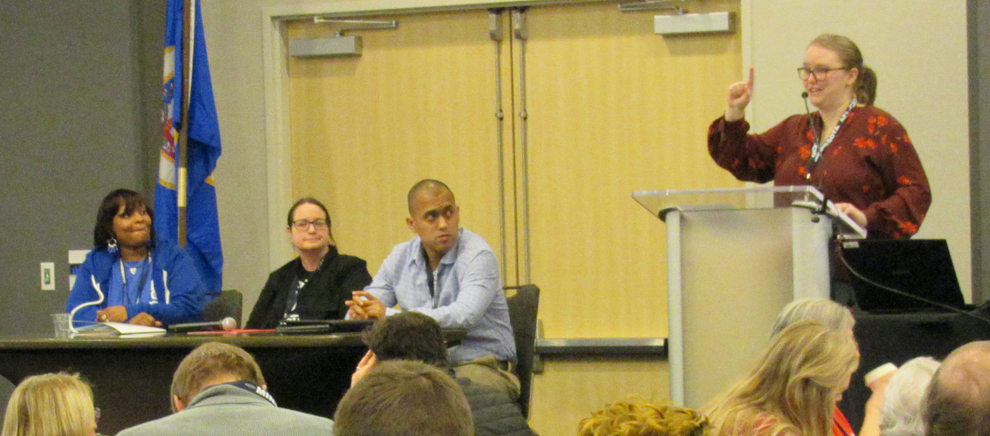

Share
Rank and file union members and leaders from across the state gathered February 6-7 for the Minnesota AFL-CIO’s 2020 Campaigns Conference. The theme was “Stand Up, Fight Back!”
“As union members, it’s a familiar motto, but it’s also an apt description of what our labor movement is all about,” said Bill McCarthy, the state labor federation’s president, addressing the 250-some union activists at the conference at the Delta Hotel on Industrial Boulevard NE.
The conference featured panel discussions on union organizing, previews of state legislation, and workshops teaching social media skills, among other topics.
But the 2020 U.S. presidential race loomed large.
“We are just nine short months away from the most important election of our lifetime,” McCarthy said. “I know that we seem to be saying that every two years, but these are the times in which we live.”
“If this administration is allowed another four years to continue its assault on workers’ rights, civil rights, and the very fabric of our democracy, it might take a generation to undo the damage,” McCarthy warned.
“So, it will be up the labor movement to deliver Minnesota’s electoral votes for our labor-endorsed presidential candidate,” McCarthy said.
“And while next year’s election is certainly about putting a stop to the disaster in Washington, it’s also about creating positive change for working people here in Minnesota,” he emphasized.
“By retaining our working families majority in the Minnesota House and flipping just a handful of seats in the Senate, we can finally act on key labor priorities,” McCarthy said, including quality public education, affordable healthcare, and investing in transportation needs.
“And most importantly,” McCarthy continued, “we can guarantee that every working Minnesotan has the right to freely organize without interference or intimidation.”
The gathering included Building Trades workers, public employees, teachers, nurses, service employees and others.
“The fights were fighting, they’re all tied together,” said Bethany Winkels, the Minnesota AFL-CIO’s executive director.
Winkels emphasized that it’s the issues that drive the labor movement’s involvement in politics. “We’re not out to elect anybody —we’re out to change the lives of working people.”
Winkels introduced a panel on worksite organizing, noting that “we know the most powerful conversations we can have are in the workplace.”
Laura Askelin, political organizer for AFSCME Council 5, stressed the importance of broadening the base of active members. “Figure out what they want to do and make it accessible to them,” she said. And make it fun, too. “We’re not growing the labor movement if we’re relying on the same small group of folks,” she said.
Catina Neal, second vice president for Minneapolis Federation of Teachers Local 59, shared her strategy for connecting with members. She brings lunch. “Having those one-to-one conversations have been the most effective,” she said.
In reaching out to members, “you have to be a good listener, you have to stay engaged,” said Octavio Chung Bustamante, organizer for the Laborers union.
Several speakers pointed to the importance of pushing back against the “divide and conquer” tactics used by labor’s opponents.
“They’re really, really good at making sure we all don’t get on the same page,” said Stephen Cousins, the AFL-CIO’s central region field director. “The Trump Department of Labor is actively trying to play us against each other.”
“It’s really important we are one united labor movement, especially this year,” AFSCME’s Askelin said.
“When we start saying, ‘oh, I’m a Democrat, oh, I’m a Republican, that’s when we start losing members,” said Montserat Garibay, Texas AFL-CIO secretary-treasurer.
Garibay observed: “the same people opposing immigrants are the same people attacking union rights.”
“We have to invest in people who look like me, people who have an accent, people who are immigrants.”
“The labor movement can really make a difference when you embrace our community,” Garibay said.
Joe Fowler, business manager of Laborers Local 563, acknowledged that about 50 percent of Building Trades members voted for Donald Trump for president in 2016 — in some unions, somewhat more or somewhat less.
“I don’t care if you’re a Democrat or a Republican,” Fowler said. “I care if you participate and move pro-worker resolutions” at the upcoming precinct caucuses.
“There’s a great cultural divide in this country,” said Ryan Winkler, the DFL’s Majority Leader in the Minnesota House of Representatives, addressing the conference. “It’s not just political, it’s not about Trump or not Trump.”
Winkler pointed to the historic partnership in Minnesota between the labor movement and the DFL Party, a partnership which helped to advance economic security and build the middle class.
The question, he said, is “are we going to let the forces of greed and fear destroy what we have built together?”
“Everything we have built for the last 100 years is at stake,” Winkler said.
“Together, we can make a huge difference in the lives of Minnesotans when we come together and work for the things we all care about,” Winkler said.
The Minnesota AFL-CIO’s Bethany Winkels summed it up. “While elections matter, the matter because they’re a tool to build power,” she said. “We want to win elections so we can have elected officials standing with us on our agenda.”

